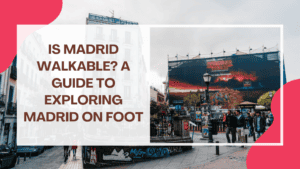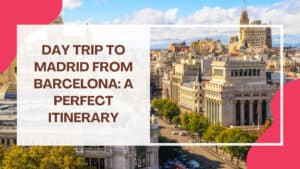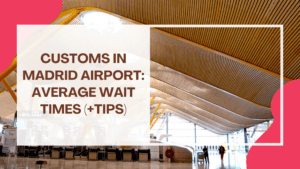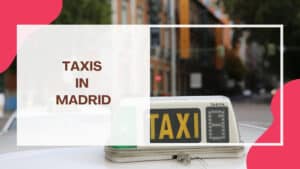Safety Guide for Solo Female Travelers in Madrid: Tips and Advice
Planning a trip to Madrid?
This stunning city is on the bucket list of many, due to its amazing history, delicious food, rich culture, and tantalizing nightlife.
However, like any big city, it can be intimidating – especially if you’re a woman traveling alone.
While Madrid is a relatively safe city, you still need to be cautious. That’s why we’ve prepared this guide to let you know how to stay safe while exploring! We’ll cover everything you need to know, including:
- Main safety concerns to watch out for
- Tips for keeping safe
- Resources (who to call in an emergency)
- Frequently asked questions.
Let’s get into it so you can have the best time during your trip to Madrid!
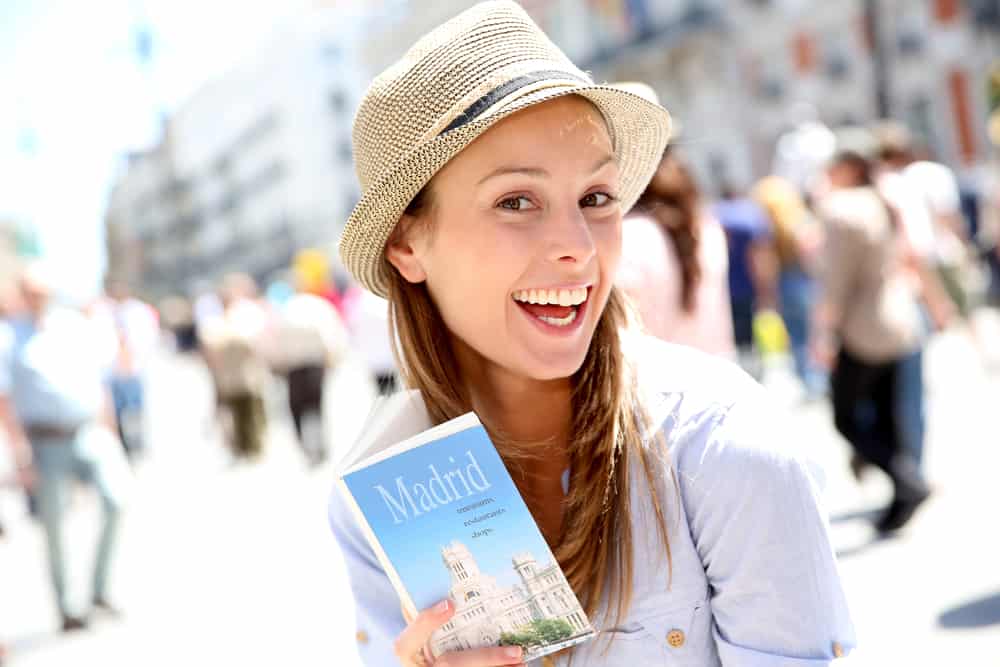
Is Madrid safe for solo female travelers?
Madrid is generally safe for female travelers, even at night! Although it’s a bustling city, Madrid also boasts having one of the lowest crime rates in all of Spain. As long as you remain cautious, you’ll enjoy a worry-free time in Madrid, even if you’re on a solo trip!
What Are The Safety Concerns For Solo Female Travelers In Madrid?
While Madrid is generally a safe city for women traveling alone, there are a few things to be aware of:
Pickpocketing
The main concern in Madrid is pickpocketing.
Pickpocketing is especially common at the airport, in the central metro stations, and at major tourist attractions. However, if you are cautious it’s pretty easy to avoid being stolen from.
Make sure not to store valuable or important items in the external pockets of your purse or backpack. Instead, keep them safe deep within your bag. Stay alert at concerts and festivals, and check your pockets frequently.
While you still need to be careful not to leave your smartphone lying around, the level of technology present in modern phones makes resetting them or unlocking them without a password close to impossible. As such, they’re a less frequent target nowadays.
Harassment
Unfortunately, like everywhere else in the world, harassment is a possibility in Madrid. However, if you stick to the safer neighborhoods, the risk is minimal.
If someone does approach you, engage as little as possible. You can also call a friend or family member, and pretend you are with someone or waiting for someone. If the situation escalates, don’t be afraid to loudly reject and draw attention to yourself.
Nighttime Safety
Madrid has a vibrant nightlife which you won’t want to miss out on. If you can, it’s better to go with a group – or even make friends once you’re out!
Stick to well-lit areas while walking, and don’t get overly intoxicated. The biggest risk at night is still pickpockets, so keep your wits about you. However, you don’t need to be too worried.
Unlicensed Taxis
Official taxis in Madrid are white with a red stripe on the front doors and embossed with the city’s seal.
Make sure not to get into any other taxi, as it may be unsafe (plus, you’re probably going to be ripped off!). Madrid also has Uber and Cabify, as well as a good metro and bus network.
Drink Spiking
In general, never leave your drink unattended or uncovered. If you do need to leave your drink, cut your losses and buy a new one!
It’s also a good idea to watch your drink being made. If you feel confused or unwell, talk to the bar staff or local authorities right away.
Tips For Staying Safe In Madrid As A Solo Female Traveler
Traveling on your own opens a whole world of exciting possibilities. That doesn’t mean you should compromise your safety, though! If you’re a solo female traveler, make sure to follow these tips while being immersed in the beauty of Madrid.
- Stay in well-reviewed accommodations: Choose hotels or Airbnb’s with a lot of reviews. Accommodation options that boast 4.5 stars with a thousand reviews is a much safer choice than 5 stars with only a handful! If you’re staying in hostels or backpackers, opt for one with a women-only dorm or private rooms if you can afford it.
- Avoid poorly lit areas at night: Stick to well-lit, populated areas when walking at night. Use Google Maps to find the best route to your destination, and learn it before you head out. You don’t want to have your nose in your phone or look clearly like a tourist!
- Be cautious in the metro late at night: Like any major city, the public transportation is a little sketchier when it’s late. Don’t sleep on the train, and if you wear headphones, keep them at a low enough volume to still be aware of your surroundings.
- Avoid excessive alcohol consumption: Take it easy on the booze and any other substances (keep in mind that while cannabis is decriminalized in Spain, it is still illegal to consume in public). Eat a full meal before going out for drinks, and make sure to have plenty of water.
- Keep belongings secure and avoid displaying valuables: Keep anything precious in the interior pockets of your bag, or in zippered, inside pockets of your clothing. Avoid wearing overly fancy jewelry, or carrying too much cash.
- Stay aware of your surroundings, especially in crowded areas: Stay alert, and avoid wearing headphones or going on your phone too much in public!
- Register with your embassy (if applicable): In many countries, you can register your travel with your national embassy. That way they know you are in the country if anything goes wrong.
- For U.S. travelers, register with the STEP (Smart Traveler Enrollment Program): If you’re a citizen of the United States, you can register with STEP. This allows you to receive important travel updates from the embassy and makes it easy for them to contact you (or vice versa) in case of an emergency.
- Share your itinerary with someone you trust: Let a family member or close friend know your travel plans. This includes your basic daily activities, transportation use, and where you’re staying. It’s a good idea to also give them the phone number of your hotel, hostel, or host.
- Have a local emergency number saved on your phone: The emergency number in Spain is 112. The operators generally speak both English and Spanish, as well as having translators for some other common languages. However, it’s still a good idea to know some key phrases in Spanish.
- Learn basic Spanish phrases, especially ones that might be helpful in emergencies: This can help not only if you need to call emergency services, but also as a general safety measure. Some examples include, “¿Alguien habla inglés aquí?” (“Does anybody here speak English?”), “Tengo una emergencia.” (“I have an emergency.”), and “¡Necesito una ambulancia!” (“I need an ambulance!”).
- Avoid giving personal information to strangers: Even if you’re in Madrid looking for love, it’s best not to give out your travel plans or accommodation address to anyone. If you want to meet up with someone, do so in safe, public places. It’s also a good idea to use WhatsApp for communication rather than social media, especially if you post your travels frequently.
- Choose taxis or reputable ride-sharing services over hitchhiking: Avoid hitchhiking unless it’s an absolute emergency (no, getting to a festival doesn’t count!). If you’re on a budget, Madrid also has good public transport options like trains and buses. Get a pass and book in advance for the cheapest fare price.
- Check reviews of places or activities beforehand: Go to well-reviewed attractions as they’re more likely to be safe. Avoid any locals who approach you offering private tours or trips; they’re scammers at best, and could even be dangerous.
- Dress modestly or in line with local customs: Dress comfortably and casually in the daytime (not too casually – while a nice shirt and jeans are fine, sweatpants or leggings may mark you as a tourist). It’s fine to dress up for a night out (and in fact, you might not get let into the clubs if you’re not looking your best!), but in general, keeping it pared down prevents unwanted attention. In general, sandals aren’t usually worn except in the height of summer, so opt for close-toed sneakers or nice boots instead.
- Trust your instincts: If you feel like something is wrong, it probably is! Trust your gut and leave any situation that makes you uncomfortable. It’s always better to be safe than sorry.
Resources Available To Solo Female Travelers Who Need Help
Although you hopefully don’t have to use them, these resources are a lifesaver in times of emergencies. Keep these details written somewhere you can easily access, and always refer to official information!
Emergency Tourist Assistance Service (SATE)
SATE is located inside the police station at Callede Leganitos, 19 28013, and their phone number is 902 102 112.
They’re the first point of call if you need help in Madrid and can assist you in filing police reports, canceling credit cards, getting in touch with your Embassy, as well as a range of other matters.
U.S. Embassy
If you’re a citizen of the United States, you can get help at the Embassy. It’s located at C. de Serrano, 75, 28006, and their phone number is (+34) 91 587 2200.
Alternatively, a list of contacts can be found on their website. You can get in touch with the embassy for life or death emergencies and passport or visa issues.
Emergency Services
If an emergency is happening, you should first call the Spanish authorities on 112. Madrid has highly trained and professional police, medical, and fire services.
Medical Issues
For minor medical needs, Madrid has many pharmacies that can provide you with medication and advice.
If you are unwell, you can visit a Centro de Salud, which is a health care center with GPs and other medical professionals.
It’s a good idea to have international health insurance, but even if you don’t you can still be seen (appointments are usually 20 to 50 Euros). There are many healthcare centers all around Madrid.
If it’s an emergency, go immediately to the nearest hospital, or call 112 to get an ambulance.
Women’s Health
Feminine hygiene products are readily available in Madrid from supermarkets, pharmacies, and corner stores.
Most places just carry pads and tampons, but some pharmacies also carry menstrual cups or other products. Pharmacies also provide birth control, including the pill and the morning-after pill.
Crisis Hotlines
- Crisis Center against Sexual Violence Pilar Estébanez: Call 900 869 947 or Livechat
- Service for all forms of violence against women: Call 016 or visit https://violenciagenero.igualdad.gob.es/informacionUtil/recursos/telefono016/home.htm
- For mental health crises, you can contact: International Association Telephone of Hope (ASITES) at 717 003 717, Samaritans in Spain at 900 525 100, or Psychologists Without Borders at 658 712 646
FAQs
What are the specific areas of Madrid where solo female travelers should be more careful?
While Madrid is generally safe, it’s better to avoid Puente de Vallecas, Orcasur, Orcasitas, Entrevías, San Diego, Palomeras Bajas, and some areas of Villaverde and Carabanchel late at night.
What are the specific times of day or night when solo female travelers should be more careful?
You should be cautious all of the time, but especially at night. Trains stop running at 1:30 a.m., so it is advised to be home or have secure transport plans after that time.
Is Madrid safe to walk alone at night?
Yes, but it is still safer to walk with a group! Make sure to stick to well-lit and populous areas.
Is public transport in Madrid safe for women?
Yes, public transport in Madrid is safe for women, but you should still stay aware of your surroundings and be cautious at all times.



